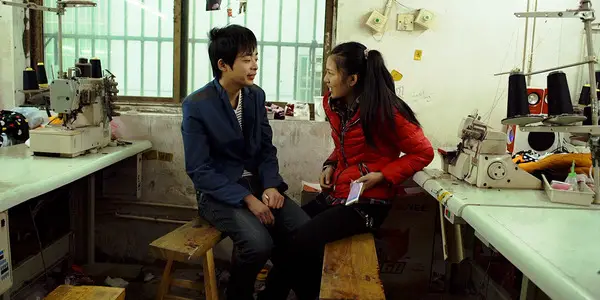Toronto International Film Festival 2023: Wang Bing’s YOUTH (SPRING) Offers An Intimate Look At Working Class Youth

Soham Gadre is a writer/filmmaker in the Washington D.C. area.…
Often you’ll see very pointed questioning about whether a movie should be as long as it is, and suggestions on what sections to cut. Many times, these suggestions are more for the convenience and comfort of the viewer rather than any real understanding of what the film “needs” or whatever. For filmmakers like Frederick Wiseman and Wang Bing, both of who have very long documentaries playing at TIFF and both of whom were selected for Competition at Cannes this year, the duration is basically a fabric of how they want you to experience their subjects. For Wiseman, his films try to create a totalizing image of institutions regarding the personal, social, and political. No stone is left unturned in the excavation and thus, you get to leave the movie having seen and heard nearly all that there is to say, from the mouths of the exact same people who live and experience what is presented every day.
Youthful Exuberance
Similarly, Wang Bing’s Youth (Spring), like many of his documentaries, most notably West of the Tracks – tries to create the experience of having been among his subjects – a group of young textile workshop workers, mostly in their 20s, who live literally next door to where they work. The durational nature of the film allows for mundane details, conversations, and confrontations to take place with a unique clarity and linearity that is rare in documentary cinema. We not only get an experience of the working environment, in which Wang’s camera remains a patient observer to the dynamics at play between the difficult and ruthlessly efficient work these young people have to do day in and day out, but also the ways they let off steam and energy amid an a near complete absence of privacy.

The intimacy of the environment is inherently clear from the beginning. Wang shoves the camera into the subjects’ personal space when they are sewing pants or coats, giving both a sense of uncomfortable surveillance as well as a view of the physical toll and level of instinctual precision the job takes – the workers’ eyes dart around, their hands and arms seem to be moving the fabric through the machine in fast-forward. There’s a quota to hit for these workers if they have any hopes of getting paid. They’re surrounded by piles of clothing and fabric and in cramped environments. There’s practically no escape either because they live in the same building and floor where they work, on a street titled “Happiness Road”. Their rooms are shabby dormitory-like abodes with bunk beds and each of them shares with at least one other person. Many of the workers are from poor rural states like Anhui who have moved to the town of Zhili, a central hub for textiles near Shanghai.
A Mental Escape – By Any Means Necessary
But this isn’t some sob story or misery porn. Wang’s film is filled with an extraordinary level of compassion to the ways that young people, no matter their place or positioning in the world, have a universal sense of companionship in the hopes of love and a need to move along in the world. Youth has the parenthetical “Spring” denoting that it’s the first part of a much greater project, but also can be interpreted as a state of being. The youth in question is burgeoning in sexual energy and romance. Different workers link up with others, some try to convince and profess their unrequited love, and many of them engage in roughhousing and sexually explicit jokes that all may come as a shock to particularly American liberal audiences who come to think of Asia as an austere sexless society.

China’s reputation in the American mind is a complicated one. On the one hand, there’s a fetishization – equal parts ironic and sincere – of the country as a magical cultural counter to the United States global hegemony. On the other hand, it is also fantasized as a near-Satanic presence, the Cain to America’s Abel. Perhaps a necessary existence, but only to serve as a continued validation for the American war machine’s worst impulses. Youth (Spring) condenses all these fears to realities of labor. The American products lying around – Sprite cans, Marlboro cigarettes, Hollywood movie posters – as well as the workshops themselves, which often make products for American markets, tie the two countries together into a commerce that remains unmistakably capitalist. When the worker’s demand rate increases on their production, namely a tiered rate system based on the difficulty of sewing, their manager begins to insult them. The external factors exerting pressure on the textile are left as phantoms, mainly because for these young workers, that’s all that they will remain. The workings of people with much more power are so out of grasp both mentally and physically, that their fight is over simply what they can control.
Conclusion:
In a current media environment where the cookie-cutter template for the documentary is talking heads explaining moments from different perspectives, Wang’s film lays bare the perspectives of his subjects through imagery that augments the compacted space and adolescent/20-something energy that yearns to find any sort of solace and comfort and freedom in a necessarily labor-intensive situation. Nary a single moment goes by without someone lighting up a cigarette or drinking an ounce of alcohol. During dinner – often just cheap food stall noodles or even cheaper, from a ramen packet – the workers jokingly discuss getting hooked on smoking and some confess starting the habit at an age as young as 12. It’s these kinds of conversations, over food and drink, talking about life and habits and connecting on being young and working together that make Youth (Spring)‘s 3-plus hour length not only necessary, but an absolute gift to sit through.
Watch Youth (Spring)
Does content like this matter to you?
Become a Member and support film journalism. Unlock access to all of Film Inquiry`s great articles. Join a community of like-minded readers who are passionate about cinema - get access to our private members Network, give back to independent filmmakers, and more.
Soham Gadre is a writer/filmmaker in the Washington D.C. area. He has written for Hyperallergic, MUBI Notebook, Popula, Vague Visages, and Bustle among others. He also works full-time for an environmental non-profit and is a screener for the Environmental Film Festival. Outside of film, he is a Chicago Bulls fan and frequenter of gastropubs.













